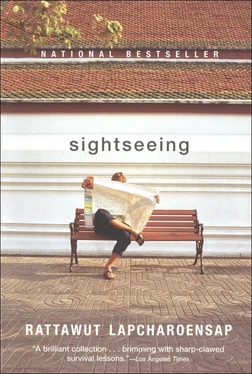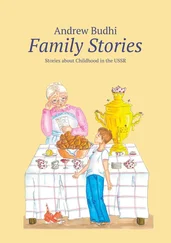I thought Papa had said something to me. But then I realized he was whispering to the chicken.
I left, the keys to the Mazda hot in my hands. I thought of getting in the Mazda and driving off. But I didn’t know where I would go. Perhaps I would pick up Noon from her house. Perhaps she would know.
“What did he say?” Mama asked. I put the keys on the kitchen counter, walked to my room. “Ladda,” Mama called after me. “What did he say?”
I sat down and tried to study for a trigonometry exam. But I couldn’t concentrate. Right angles, hypotenuses, tangents, sine, cosine: They all passed before my eyes without meaning. After a while, those lines and equations seemed like just another sport men had created to pass their time on this earth, and it occurred to me then that the difference between cock-fighting and trigonometry was a difference in degree, not a difference in kind. Both were diversions designed to amuse, games with varying odds for victory. All human activity suddenly seemed to me composed of such sport: We each chose the game we thought would yield the most for us and our own. We gambled, gambled selfishly, gambled more than we could afford, the odds staggeringly stacked in somebody else’s favor. Papa, of course, was an obvious example. But Mama, too. She’d spent a good part of her life making bras for anonymous women living in faraway places she’d probably never see. She called it an honest living. But, as I sat in that room, those triangles staring at me from the textbook, it didn’t seem like much of a living. Mama’d wagered her strength and her labor and the sweat off her brow and the high-noon decades of her life, but in the end she only stood to make Miss Mayuree wealthy. Noon, too, with her monomania for boys, the way she indiscriminately anted her affections in the hopes of unattainable rewards. Because love was the biggest gamble of them all. Love had the worst odds. The rules were convoluted and mystifying and changing all the time. Even Papa’s sister must’ve known this. The house would always win that bastard game, so I decided at that moment to become its undying enemy forever.
I put the book away. When I looked up, I saw the Range Rover parked in our driveway, Little Jui and his goons and that Filipino boy Ramon getting out of the car. I moved to the side of the window so they would not see me.
Mama went out, a fist around the Mazda’s keys. Little Jui had a bouquet of roses nestled in his arms. As Little Jui spoke, Mama kept shaking her head, like she couldn’t believe what he was telling her. She kept looking toward the chicken house, waiting for Papa to appear. But he never did. After some more talking, Little Jui handed Mama the roses and Mama gave him the keys to the Mazda, as if making an equal barter. Little Jui tossed the keys to Dam and the goons went to Papa’s truck. Little Jui got back in the Range Rover with Ramon and soon they all disappeared down the road. Mama just stood there with an astonished look on her face, as if the Mazda had come to life and decided on its own to accompany the Range Rover into town.
She came into my room.
“These are for you,” she said, throwing the bouquet onto my bed, a few loose petals flying across my sheets. “I don’t want them, Mama,” I said curtly.
“That’s it, Ladda,” she yelled suddenly. “I’ve had enough. Pack your bags.” Mama’s hands shook involuntarily. She stared at them, clasped them tightly together to stop the shaking. “Mama,” I said. But before I could ask her to calm down, she sat on my bed and seemed to slump from some enormous, invisible weight. She started to cry, hands in her lap, lips quivering, eyes staring angrily ahead. I went over, sat down beside her, put an arm around her shoulders.
“C’mon, Mama.”
She wiped snot with the back of a hand. She steeled herself against more tears. “I’ll kill him before he can go back to that cockpit.”
“Mama—”
“What’s with the roses, Ladda?” Mama asked. “He said you two were in love. I told him I’d cut off his dick before he ever got near you again.
“He’s been bothering me, Mama,” I said, relieved to be telling her at last. “I ignore him, though,” I said. “I hate him more than you can imagine. I’d cut his dick off too, Mama.”
Mama patted my knee. She got up and gathered the roses into her arms. She walked over to my window and opened the screen. “Hey,” she yelled, throwing the roses out the window toward the chicken house. They landed impotently a few feet away. “I hope you’re satisfied,” Mama said. “Have fun walking to work from now on.”
XV
Saturday night, Papa came into the house and said this would be the last time. He asked us for patience. We stared at him blankly. He was going to bring all the remaining cocks to the cockpit tomorrow, he informed us, staring at his feet as if embarrassed. Win or lose, he wouldn’t be going back again. He was sorry. He never meant to hurt anybody. He looked at Mama, looked at me, waited for an answer. But Mama just said the house would be empty when he returned. Papa nodded, like a criminal accepting his sentence, and walked out of the house, dragging his slippers across the yard, his head hanging limply from his neck.
Mama got up and called Miss Mayuree. As she talked into the phone, I abandoned my dinner and walked outside. Years before, my feet would’ve led me to the chicken house, to Papa; they wanted to go there now. The air was thick with humidity. The monsoons were coming in a few months. The mosquitoes were hatching. The first of the season’s cicadas had arrived to creak and whir in the rubber trees. I listened to them. My feet began to lead me toward their sound. I walked across the yard, I don’t know why. I suppose I simply wanted to get away.
When I arrived at the ditch, I hopped over it easily, and soon I found myself under the dark rubber canopy, all around me the shrill soprano cries of the cicadas in the eaves, their song reverberating through the trees like prayer echoing around some temple pavilion. The air thrummed with the noise. When I was a child, I’d always been afraid of the rubber grove, with its strays howling like so many ghosts during the nighttime hours. But now, standing in that pitch-black forest, watching Mama’s light in the kitchen window and Papa’s light in the chicken house shining through the thicket like two equidistant flames, I felt safe among the trees and I felt that out there, outside the grove, was where real danger lay. There were no ghouls here — just animals foraging for food, mating and fighting and singing their songs.
I sat down cross-legged. I felt I might be able to sit there forever. But then the feeling passed. That’s your life, the cicadas seemed to say to me as I looked out at our property. That small patch of ground. Those are the people you love. Those two distant lights. That’s your papa in the chicken house. That’s your mama in the kitchen. You can’t hide in here forever. I got up and walked farther into the trees, turning my back upon the property, thinking I might get myself lost. But the cicadas told me no. They reminded me that this wasn’t even a real rubber forest, just an abandoned plantation. I’d only end up in town if I went any farther. So, after a while, I turned around and walked back toward the house. I paused at the ditch, thinking I might go into the trees again, thinking I might never come back, wondering how long it would take for Mama and Papa to notice my absence. But that feeling soon passed as well. I went back over the ditch.
XVI
Sunday, under a bright and cloudless sky, Mama and I watched Papa from the porch as he put the four remaining cocks into a rusted wheelbarrow. Mama stood there chewing her cuticles, leaning against the house. In a quiet voice Papa said he’d understand if we weren’t here when he got back. He said he loved us both. He said he would put in overtime at the roofing factory. He said, “I’m sorry, Saiya,” but Mama looked right through him. He stood there dumbly, lips parted as if he might say something else, and then he walked out the driveway, his whole body leaning into the wheelbarrow’s weight while the chickens clucked noisily.
Читать дальше











